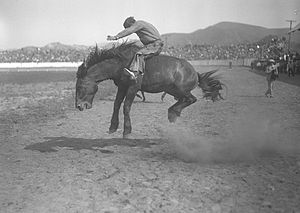 Image via Wikipedia
Image via WikipediaSo, I’m wrapped up in the latest superhero novel. The storyline is exciting, the characters are engaging, the action propels me along. It’s a real page turner. Then my enjoyment comes to a screeching halt when the action shifts to a fictional country called “Lieberstan”.
Lieberstan? Sounds familiar.
Wait – wasn't Stanley Martin Lieber the real name of Marvel Comics head honcho Stan Lee? Stan Lieber . . . Lieberstan.
Ah, I get it.
Unfortunately, I “get it” every time the country is mentioned – which, since a major turning point in the story occurs there, is quite often. I can’t help thinking of the wisecracking huckster persona of Mr. Lee, who has been so successful in promoting himself as well as the Marvel heroes he helped create that he’s practically a self parody.
As a result, every mention of “Lieberstan” throws me out of the story.
Homages – references to stories or creators which influenced the writer – can be fun. They provide an indirect way for the writer to acknowledge such influences. They also provide fans with the fun of searching for “Easter eggs” and with a feeling of being “in the know”. If you get the reference, you can call yourself a true fan.
But the wrong kind of homage creates an unnecessary association or image in the reader’s mind. Such an image can throw the reader out of the story like a horse which has suddenly decided to buck its rider.
Comic book artists, for example, often draw covers that evoke famous covers of the past, such as that of Fantastic Four # 1. But such covers are meant to make the reader think of the source, either as a parody or because the artist wants to capture some essence or feeling associated with Fantastic Four # 1. Any artist who draws a picture of heroes gathering around to fight a giant monster emerging from the ground and doesn’t expect readers to think of FF # 1 is fooling himself.
Sometimes an homage can mean the writer is merely trying to be clever. I fell prey to this vice myself: In grad school, I wrote a film script that included an investigative reporter named Jack Gittes. My professor immediately caught the reference to Jake Gittes, Jack Nicholson’s character in Chinatown, and chided me for it. Why on earth, the professor asked, did I want viewers to think of Chinatown in a film about a rock ‘n’ roll band?
Sometimes the writer draws so closely from source material that an homage can be unintentional. I fell prey to this vice, too. In previous drafts of The Power Club™, my club of super-powered kids elected a new leader every month. Why? Because one of my sources of inspiration, the Legion of Super-Heroes, elected a new leader every year.
A member of my writing group pointed out, however, that electing a new leader every month seemed artificial. I agreed, so I changed it.
What purpose is served by calling a fictional country “Lieberstan”? None, as far as I can tell. The writer may have intended for the reader to think of Marvel's epic super-battles. But this association destroys the uniqueness and seriousness of the writer’s own world. As a reader, I don’t need to associate his world with Marvel to enjoy it. In fact, the name undermines suspension of disbelief by drawing attention to the fact that this is a made-up country in a made-up story.
Homages can be fun, but, if you use one, make sure you have a good reason for wanting the reader to associate your story with its source of inspiration.
What do you think? Do you have unnecessary homages in your story?


2 comments:
I have a few; a line of dialogue or a reference to an event, or a habit/activity characters in a favorite book might have/do. I've named a character or two after a friend or a character in a favorite book of mine. I think it's something all authors dabble in from time to time. But the most subtle are the best, in my opinion.
Homages to people or events from your life will probably not be picked up on by readers, except for those who know you well. This is all well and good. If you're going to use an homage, make sure it's not overly obvious or does not refer to something so well known that it jumps out at the reader.
Post a Comment